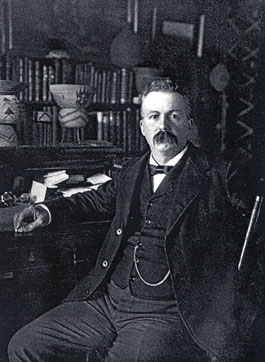Chrono-Biographical Sketches
Merriam, C(linton) Hart (United States
1855-1942)
zoology, biogeography, ethnology, science administration
 |
C. Hart Merriam practiced medicine for several years before finally giving into the urge to become a professional naturalist. At the age of thirty he was offered a directing position of a small federal agency in Washington, D.C.; within a few years this had become the U. S. Biological Survey. With Merriam at its helm this relatively small body of naturalists did a large quantity of important work over the years preceding and following the turn of the twentieth century, including biological surveys (especially of western U. S. lands), specimen collecting, faunal reviews, conservation, and systematic revisions of major animal groups. Merriam himself spent much time in the field and published some five hundred works, mostly on mammals (early in his career he dealt primarily with birds). He was a very effective administrator, introduced new means of trapping and preserving specimens, and succeeded at making friends in high places (President Theodore Roosevelt was one supporter). Eventually the times and new agendas caught up with him, however, and under pressure he resigned from service in 1910 to take advantage of private funding he had received. Most of his (many) remaining years were spent studying North American bears and taking up a new interest: the languages and other habits of Western Native Americans. Merriam was an uneven performer as a taxonomist; he named some six hundred new forms but many have since been overturned. Although not a great theorizer, he did introduce one concept that has assured his permanent place in the history of biogeography studies: the life zones model. In research carried out in the late 1880s and 1890s he investigated the notion (earlier suggested by Joel Allen) that ranges of temperature extremes provided the main control on the geographical distribution of animals. It has frequently been written that Merriam was a key transitional figure in natural history studies between those carried out by the older breed of less formally trained naturalists, and the world of twentieth century professional specializations. |
Life Chronology
--born in New York City, on 5 December 1855.
--1872: assistant naturalist with the Hayden geological survey in the
western U. S.
--1874-1877: studies at the Sheffield Scientific School, Yale University
--1878: helps found and is first president of the Linnaean Society of
New York
--1879: M.D., College of Physicians and Surgeons, Columbia University
--1879-1885: practices medicine in upstate New York
--1882-1884: publishes his The
Mammals of the Adirondack Region, Northeastern New York, in two
volumes
--1883: visits seal fishery in Newfoundland
--1886-1910: head of the U. S. Department of Agriculture's Division of
Ornithology and Mammalogy (renamed the Division of Biological Survey in
1890)
--1888: helps found the National Geographic Society
--1890: publishes his Results
of a Biological Survey of the San Francisco Mountain Region and Desert
of the Little Colorado, Arizona, with L. H. Stejneger
--1891: serves on the American-British fur seal commission
--1891-1892: president, Biological Society of Washington
--1892: publishes "The
Geographic Distribution of Life in North America, with Special Reference
to the Mammalia" in Proceedings of the Biological Society of Washington
--1898: publishes his Life
Zones and Crop Zones of the United States; heads natural
history expedition to the Mount Shasta area
--1899: organizes the Harriman expedition to Alaska
--1900-1903: president, American Ornithologists' Union
--1902: elected to the National Academy of Sciences
--1910: publishes his The
Dawn of the World; Myths and Weird Tales Told by the Mewan Indians of
California; resigns as chief of the Biological Survey
--1910-1939: research associate, Smithsonian Institution
--1917-1925: chairman, U.S. Board on Geographic Names
--1919-1921: president, American Society of Mammalogists
--1920-1921: president, Anthropological Society of Washington
--1924-1925: president, American Society of Naturalists
--dies at Berkeley, California, on 19 March 1942.
For Additional Information, See:
--Biographical Memoirs, National Academy of Sciences
(U.S.A.), Vol. 24 (1947).
--American National Biography, Vol. 15 (1999).
--Dictionary of Scientific Biography, Vol. 9 (1974).
--The Auk, Vol.
71(2) (1954): 130-136.
--Journal of Mammalogy,
Vol. 24(4) (1943): 421-436.
--Biographical Dictionary of American and Canadian Naturalists and
Environmentalists (1997).
--National Cyclopaedia of American Biography, Vol. 13 (1906).
--Last of the Naturalists: The Career of C. Hart Merriam (1974).
*
*
*
*
*
Copyright 2005 by Charles H. Smith. All rights
reserved.
http://people.wku.edu/charles.smith/chronob/MERR1855.htm
Return to Home/Alphabetical Listing by Name
Return to Listing by Country
Return to Listing by Discipline